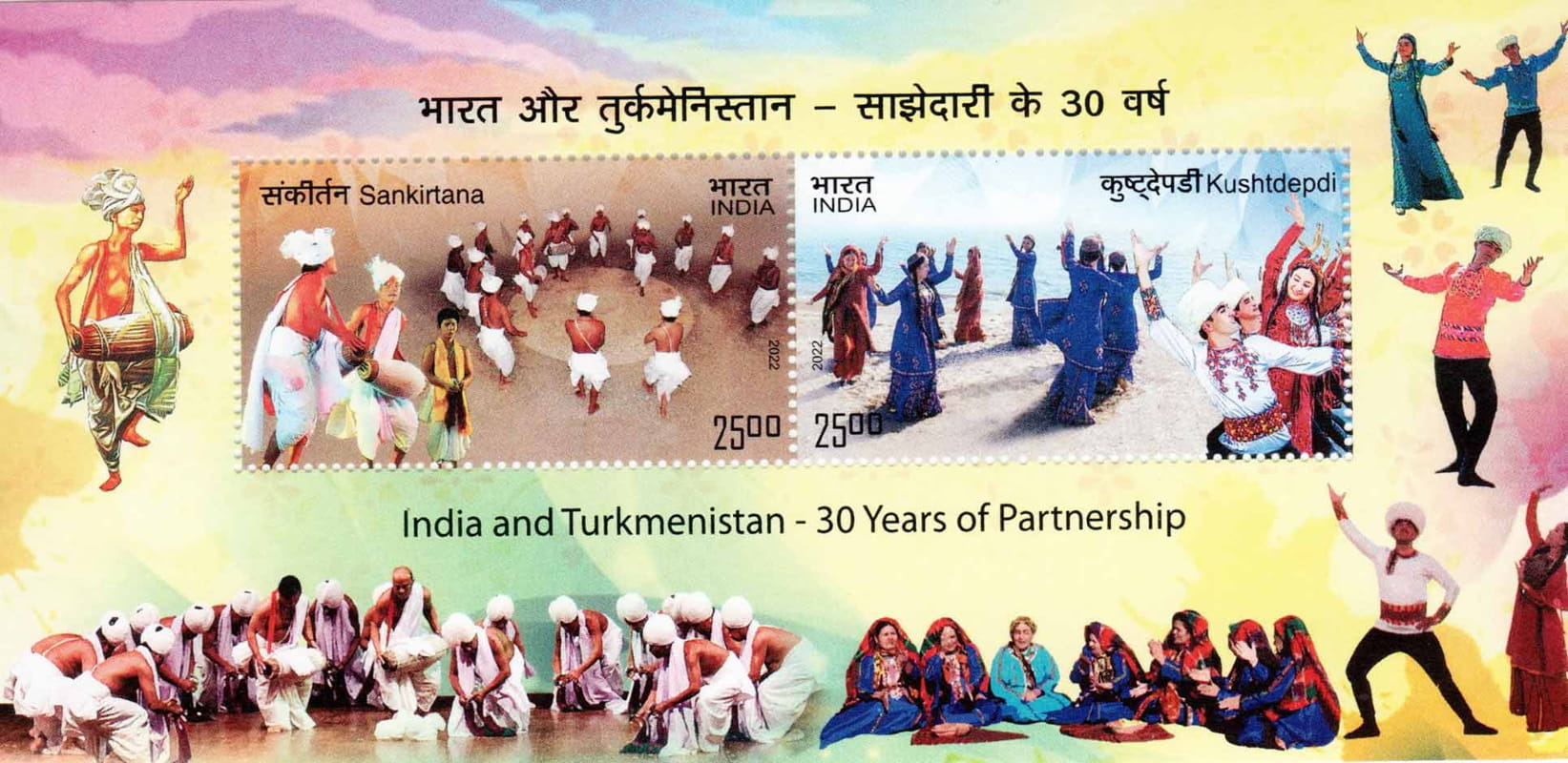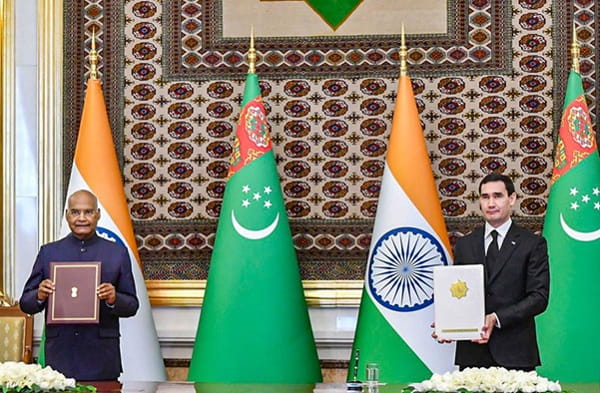
Stamps issued to mark 30 years of India-Turkmenistan ties. | Amazon.
In Turkmenistan, Indian culture is treated with great sympathy and love. This love came into our hearts first of all through our acquaintance with the art of this great country. The older generation still remembers the first impression of watching such Indian films as Sangam, Shri 420 and Sita aur Geeta, among others. And even now many Bollywood films, especially of a historical nature, are popular in Turkmenistan. As is known from history, India is one of the earliest centres of human civilisation.
Introduction
By declaring its independence, Turkmenistan established friendly and equal cooperation in international relations. Those relations between Turkmenistan and the Republic of India, which have their origins in the depths of antiquity, are now being enriched with new, influential content.
When we say India, we imagine a wonderful friendly country. Our grandfather and spiritual leader, Magtymguly, who wrote, "You dedicated to the Indians, the most fertile lands", informs us that Turkmen-Indian relations have been important since then. India is a country that presents the best feelings of friendship and brotherhood.
In this regard, the poems of the poet Gara Seyitliyev immediately come to mind. Bairam Khan Turkmen’s wonderful poems, such as the beautiful Taj Mahal, continue to live in our hearts. Well, one can give boundless examples of kind feelings when it comes to India.
The roots of ties between the Turkmen and Indian people were laid in antiquity, from the time of the Great Silk Road. This was the heyday of the great Parthian Empire, the centre of which was the territory of modern southern Turkmenistan and was one of the main international transport corridors connecting India with the countries of Central Asia, including Turkmenistan.
The deep roots of the relationship are evidenced by archaeological findings confirming that contacts between the Turkmen and Indian people existed for a long time. As it is known, Emperor Akbar's mentor Bairam Khan and his son Abdurahman Khan, the famous philosopher and poet, were Turkmen who served in the Mughal Empire administration in India. The Turkmen Gate in Delhi, built in the 1650s, also testifies to the centuries-old ties between India and Turkmenistan.
In the history of Turkmen-Indian relations, an important event was the visit to Turkmenistan by former Prime Minister, Jawaharlal Nehru, one of the most prominent political figures in the world. In 1955, Nehru and his daughter Indira Gandhi made a tour of the Soviet Union, during which they visited Ashgabat.
The famous Indian writer, traveller and researcher Radha Rayana, wrote an excellent book 'An Ancient Kinship India and Turkmenista’, which also talks about the deep history of interaction between two friendly peoples and dialogues between Turkmen and Indian cultures of many thousands.
India recognised the independence of Turkmenistan on December 26, 1991. Diplomatic relations between Turkmenistan and India were established on April 20, 1992. On January 20, 1994, the Indian Embassy was opened in Turkmenistan. In January 1995, the Embassy of Turkmenistan in India was opened in New Delhi.
Bilateral Diplomatic Relations
At the moment, the partnership between India and Turkmenistan over the past thirty two years has received an intensive impetus in many areas, including economic, political, scientific and technical and humanitarian aspects. A number of basic intergovernmental agreements, including trade and economic cooperation, cooperation in the field of science and technology, sports, defence, as well as the avoidance of double taxation, and a number of others have been signed.
The positive dynamics of bilateral relations contributes to the dialogue, which is supported and is characterised by contacts at the highest interstate and inter government levels, as well as regular meetings and negotiations between foreign policy departments.
In this regard, the visit of the National Leader of the Turkmen people, Chairman Hulk Maslakhaty, Hero of Arkadag, Gurbanguly Berdimuhamedov to India in 2010 stands out. The visit of our esteemed Arkadag to the tomb of Abdurahman Khan in Delhi at the start of the visit was an expression of the boundless respect of our national leader to our ancestors.
In 2022, former Indian President Ram Nath Kovind became the first President of India to visit Turkmenistan. Turkmenistan follows five strategic directions in its foreign policy:
(i) Peace, security, stability and sustainable development.
(ii) Development and promotion of the idea of neutrality on the world stage.
(iii) Steady increase in diversification of foreign economic relations.
(iv) Comprehensive promotion of sustainable development.
(v) The humanisation of international relations, introducing into them high standards of morality and justice.
In its foreign policy, India focuses on the development of traditional, ancient relations with the independent states of the Central Asian region, especially with Turkmenistan. Economic, scientific, technical and cultural cooperation between the two countries has become a tradition.

Former President of India, Ram Nath Kovind with his Turkmenistan counterpart Serdar Berdimuhamedo in Ashgabat, 2022. | PTI/The Hindu.
On December 18-19, 2021, the Turkmen delegation led by the Minister of Foreign Affairs of Turkmenistan, Deputy Chairman Rashid Meredov, visited New Delhi and was warmly welcomed by the Minister of External Affairs of India, Dr S. Jaishankar. The Turkmen delegation took part in the third session of the Central Asia-India Dialogue in December 2021. The meeting, held at the Foreign Ministries level, focused on complex political issues on Afghanistan, as well as trade and regional relations.
At the end of the meeting, the parties agreed to hold an annual meeting of the India-Central Asia Dialogue with the participation of Afghanistan. The parties also discussed cooperation in the fields of energy, gas and chemical industry, transport, communications, high technologies and agriculture. They expressed interest in further expanding trade and economic cooperation, including the promotion of direct relations between the business community of Central Asian countries and India.
India is a reliable partner for the countries of Central Asia, including Turkmenistan, on their development path. In this context, the ‘Central Asia + India’ format is of great importance in which priority areas such as political issues, trade and economic objectives, security, cultural and human activities, as well as the development of parliamentary relations are discussed.
Trade and Economic Ties
Turkmenistan and India are united by centuries-old relations based on the principles of neighbourliness and equal cooperation. Turkmenistan's favourable geopolitical and geoeconomic location contributes to the continuation of the long-standing traditions of active interstate relations, the development of trade and economic and humanitarian relations between the Turkmen and Indian peoples.
The Tejen-Sarahs-Mashad railway, which was commissioned during the years of Independence, is a vivid example of the great attention attached to the construction of the Great Silk Road and paved the way for the development of trade and economic cooperation between Turkmenistan and India. At present, this internationally important route gives India ample opportunity to connect with all countries of the continent.
As one of the world's fastest growing economies, the Republic of India has great scientific and industrial potential and a vast and promising market. Turkmenistan and India attach special importance to cooperation in the fuel and energy sector. In particular, there is a great demand for the implementation of the Turkmenistan-Afghanistan-Pakistan-India gas pipeline project to meet the growing demands of the Indian economy.
The construction of the Turkmenistan-Afghanistan-Pakistan-India (TAPI) gas pipeline, which was launched on December 13, 2015, has taken Turkmen-Indian relations to a new level. With a total length of 1,814 kilometres and a capacity of 33 billion cubic metres per year, this pipeline will ensure the sustainable development of the region, energy security and fruitful cooperation between the two countries.
In connection with trade and economic cooperation between Turkmenistan and India, intergovernmental commissions play a huge role. The joint intergovernmental Turkmen-Indian Commission on Trade, Economic, Scientific and Technological cooperation held its first meeting in October 2003 and its meetings are held alternately every year or two years.
Trade turnover between Turkmenistan and India in 2023 amounted to 305 million US dollars, of which exports from Turkmenistan were 6.50 million while imports from India were $300 million. As of 2023, four enterprises with the participation of Indian capital were registered on the territory of Turkmenistan and 13 investment projects were registered for a total amount of $119 million.
Turkmenistan and India also have rich experience in long-term cooperation in the healthcare and pharmaceutical industry. As a reliable and effective form of cooperation, the Turkmen-India enterprise ‘Turkmenderman Ajanta Pharma Limited’ has been operating. Frequent flights from Ashgabat to Delhi and Amritsar, which have been linking Turkmenistan and India for many years, are also an indication of active expansion and strengthening of relations.
Cultural Relations
Active cooperation in cultural and humanitarian ties between Turkmenistan and India is distinguished in the field of education. In 2002, an Indian training and production centre was opened on the basis of the Turkmen Polytechnic Institute. As part of the Indian Technical and Economic Cooperation (ITEC) programme, specialists regularly undergo short-term training in India. Since the inception of the ITEC programme, more than 400 Turkmen citizens have been trained till date.
In April 2015, the Yoga Center was opened in Ashgabat with the participation of the Prime Minister of India and the opening ceremony of the monument to Mahatma Gandhi took place. The Indian side highly appreciates the support provided by the government of Turkmenistan to the Traditional Medicine Yoga Center. Today, more than 3,000 citizens of Turkmenistan attend yoga classes.
In Turkmenistan, Indian culture is treated with great sympathy and love. This love came into our hearts first of all through our acquaintance with the art of this great country. The older generation still remembers the first impression of watching such Indian films as Sangam, Shri 420 and Sita aur Geeta among others. And even now many Bollywood films, especially of a historical nature, are popular in Turkmenistan.
As is known from history, India is one of the earliest centres of human civilisation.
The Hinduwan Gate (Hindi Gate) in Merv, one of the largest and medieval cities of Turkmenistan, the Turkmen Gate built in the centre of the Indian capital, the Qutab Minar in Delhi and the Minaret of Gutluk Temir in Koneurgench are the architectural symbols of the culture and interaction of the two peoples.
Conclusion
It can be stated that today Turkmenistan and India maintain high dynamics of development of interstate dialogue in the political-diplomatic, trade-economic and cultural-humanitarian spheres. Turkmenistan creates the necessary conditions for strengthening friendly relations between the two countries, preserving and steadily deepening traditional cooperation.
(Exclusive to NatStrat, courtesy India Central Asia Foundation)